Ebenezer, Heartbreak, & Hope
Click Here to See the Kenya Photo Album
7.15.13
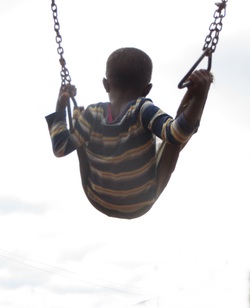
Over the last couple days, a lot of the kids have come up to Megan and me and asked if we could spend the night at Faraja. We told them we eventually would, but hesitated because it would most likely necessitate a 5am or earlier wake-up (yes, I'm lazy). Well, tonight is the night we decided on for our sleepover.
We also decided we would make them food. But what to make for 40 kids and adults in Kenya? After much deliberation, we decided upon spaghetti, because everybody loves it. With spaghetti sauce here pushing $5 per little jar, we decided to just buy 12 pounds of pasta, 10 pounds of crushed tomatoes, lots of spices, and make the lot of it from scratch. I'm glad we did, because it turned out deliciously. One sticking point was the actual cooking of the noodles and sauce, though. You see, here they cook using extremely high heat charcoals, so when the "stove" is on, there's no setting between 1-10. It's all just 11. After getting used to that, though, we were golden.
After dinner, we all watched a movie together in the dining room on a little 12 inch TV. It was at this point I realized that all the 80 inch flatscreen, 3D, 1080p, LED, 7.1 surround sound in the world can't hold a candle to watching Kung Fu Panda 2 with a roomful of kids all huddled around and engaged with every frame.
We also decided we would make them food. But what to make for 40 kids and adults in Kenya? After much deliberation, we decided upon spaghetti, because everybody loves it. With spaghetti sauce here pushing $5 per little jar, we decided to just buy 12 pounds of pasta, 10 pounds of crushed tomatoes, lots of spices, and make the lot of it from scratch. I'm glad we did, because it turned out deliciously. One sticking point was the actual cooking of the noodles and sauce, though. You see, here they cook using extremely high heat charcoals, so when the "stove" is on, there's no setting between 1-10. It's all just 11. After getting used to that, though, we were golden.
After dinner, we all watched a movie together in the dining room on a little 12 inch TV. It was at this point I realized that all the 80 inch flatscreen, 3D, 1080p, LED, 7.1 surround sound in the world can't hold a candle to watching Kung Fu Panda 2 with a roomful of kids all huddled around and engaged with every frame.
7.16.13
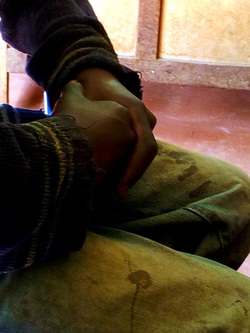
Turns out that sleeping on a bunk bed that's still wrapped in plastic isn't half bad, so long as you sleep on your back the whole time in a hoodie and pants and socks! Also, I was awoken at 3am by Martha playing out loud really, really loudly in English, which is interesting when considering that her native language is Swahili.
After half falling back asleep, I was again awoken, this time at 5am, to the sounds of the kids singing hymns, beautifully, from the dining hall. As much as the bed and pillow were calling my name, recording their singing so I could share it with you and the rest of the world spoke up more loudly. Dragged my lazy bones out of bed and into the hall, where I was serenaded for a few more tracks.
After breakfast, the kids were told to go to school and that the teachers, threatened with being fired if they didn't show up and end the strike, would arrive. The teachers were no-shows, so the kids came back home. That was a-ok with me, as it gave me a chance to check the progress of the rap class participants. I was a little disappointed to see that several of the kids who I'd hoped would participate in some of the "homework" I assigned lost interest, but it happens. There are a few who have progressed and are showing real promise, so I'll be sticking with them: Obadiah, Kevin, Ronaldo, and Angela.
After leaving Faraja in the afternoon, Megan and I were approached by a boy, 14 or so, in the street. Normally I just smile and wave, because 99% of the time when the kids come up to you and ask for something, it's just for money. But he didn't ask for money. He told us he was homeless and he wanted help and to live in an orphanage and go to school. His clothes were tattered. He told us he'd been living in the streets of Ngong for several months. I didn't know if he was a scout who was going to lead us to a group of older guys who would mug us and take our valuables, so after placing our money, phones, etc. back at our homestay, we walked with the boy, Joseph, over to Faraja.
Becky, one of the caretakers, came outside and spoke with him for a bit before inviting him inside for some tea. With the kids back from school, I was interested to see how they would react to a street kid coming through their door. To be honest, they didn't speak a word to him, but rather sized him up as kids do and kept their distance.
We then walked with Joseph up to the district children's office, waited for the official to show up, and then sat with him as he was interviewed by the officer so she could determine what to do with him. She told us some of his story didn't add up, and that she had to speak with him further, alone, to suss out more of his background. So with that, we left Joseph in her care, hoping that he got some needed help.
After half falling back asleep, I was again awoken, this time at 5am, to the sounds of the kids singing hymns, beautifully, from the dining hall. As much as the bed and pillow were calling my name, recording their singing so I could share it with you and the rest of the world spoke up more loudly. Dragged my lazy bones out of bed and into the hall, where I was serenaded for a few more tracks.
After breakfast, the kids were told to go to school and that the teachers, threatened with being fired if they didn't show up and end the strike, would arrive. The teachers were no-shows, so the kids came back home. That was a-ok with me, as it gave me a chance to check the progress of the rap class participants. I was a little disappointed to see that several of the kids who I'd hoped would participate in some of the "homework" I assigned lost interest, but it happens. There are a few who have progressed and are showing real promise, so I'll be sticking with them: Obadiah, Kevin, Ronaldo, and Angela.
After leaving Faraja in the afternoon, Megan and I were approached by a boy, 14 or so, in the street. Normally I just smile and wave, because 99% of the time when the kids come up to you and ask for something, it's just for money. But he didn't ask for money. He told us he was homeless and he wanted help and to live in an orphanage and go to school. His clothes were tattered. He told us he'd been living in the streets of Ngong for several months. I didn't know if he was a scout who was going to lead us to a group of older guys who would mug us and take our valuables, so after placing our money, phones, etc. back at our homestay, we walked with the boy, Joseph, over to Faraja.
Becky, one of the caretakers, came outside and spoke with him for a bit before inviting him inside for some tea. With the kids back from school, I was interested to see how they would react to a street kid coming through their door. To be honest, they didn't speak a word to him, but rather sized him up as kids do and kept their distance.
We then walked with Joseph up to the district children's office, waited for the official to show up, and then sat with him as he was interviewed by the officer so she could determine what to do with him. She told us some of his story didn't add up, and that she had to speak with him further, alone, to suss out more of his background. So with that, we left Joseph in her care, hoping that he got some needed help.
7.17.13
There was a weird energy in the air today at Faraja, and I don't know what the reason was. We went in the late afternoon, and all of the kids were really withdrawn, uncharacteristically quiet, and lethargic. I asked several of the kids if anything was wrong. They said no, but it's easy to see there was more to it than was being communicated.
7.18.13
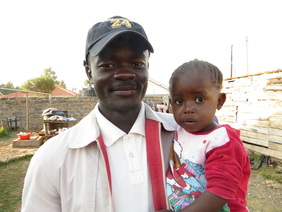
I found out why the kids were so withdrawn yesterday. Paul, one of the workers at Faraja, and one I've been working with really closely with all of the manual labor projects, was fired. I sent him a text last night to let him know that Megan and I would be around if he wanted someone to talk to. This morning he called at 7am and asked if we were available to talk. He sounded down, so I told him we would be around. He came over, and what he had to say was shocking to say the least.
For starters, he was fired because he was accused of stealing money from another one of the workers. He told me he didn't do it, and I believe him. (I'm pretty good at telling when people are lying). Martha fired him in front of all of the kids and other workers, and didn't let him defend himself. He also told Megan and me that 8 of the kids at Faraja are children of the workers, and that two of the workers are Martha's sisters. If this is true, that means that about 25% of the kids at Faraja not only aren't orphans, but they live with their mom at Faraja.
This would be fine if this was made known to us upfront. But I've always been told that every child at Faraja is a complete and total orphan. There's no need to lie to anyone who wants to help, just so they'll hopefully help more by making the situation sound more desperate.
In addition, Paul let us know that two kids had been kicked out of Faraja, one for being accused of stealing money. That's not right. Faraja has legal custody of the kids that live there, so kicking out one of the kids would be like kicking your own child out of your house years before they turn 18. Who would do that? Where would they be expected to go?
Right now I feel manipulated, lied to, and taken advantage of by an organization I've vocally and proudly supported for three years, not to mention a place where I've put hundreds of hours of sweat and work into and more money that I can probably realistically afford. This is disappointing, to say the least.
For starters, he was fired because he was accused of stealing money from another one of the workers. He told me he didn't do it, and I believe him. (I'm pretty good at telling when people are lying). Martha fired him in front of all of the kids and other workers, and didn't let him defend himself. He also told Megan and me that 8 of the kids at Faraja are children of the workers, and that two of the workers are Martha's sisters. If this is true, that means that about 25% of the kids at Faraja not only aren't orphans, but they live with their mom at Faraja.
This would be fine if this was made known to us upfront. But I've always been told that every child at Faraja is a complete and total orphan. There's no need to lie to anyone who wants to help, just so they'll hopefully help more by making the situation sound more desperate.
In addition, Paul let us know that two kids had been kicked out of Faraja, one for being accused of stealing money. That's not right. Faraja has legal custody of the kids that live there, so kicking out one of the kids would be like kicking your own child out of your house years before they turn 18. Who would do that? Where would they be expected to go?
Right now I feel manipulated, lied to, and taken advantage of by an organization I've vocally and proudly supported for three years, not to mention a place where I've put hundreds of hours of sweat and work into and more money that I can probably realistically afford. This is disappointing, to say the least.
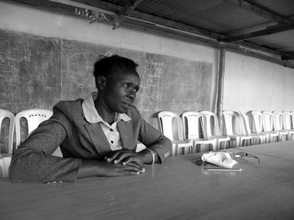
At night, I had an interview with Martha and, as much as I wanted to say, "I heard x, y, and z about Faraja. Is it true?" I had a job to do for the documentary. But I still wanted to get answers in a tactful way, so I asked her how many kids at Faraja were total orphans, and how she came to choose the workers she hired. She told me all but just a handful were complete orphans, and that one worker was her sister while the others were just friends of hers. When she answered these questions, she looked nervous and caught off-guard; signs to me of her then bending the truth. I want to get to the bottom of this, but be cautious in how I approach it.
To be honest, right now, I'm not sure in what capacity I can continue to support Faraja if this is true. This information doesn't change anything about the kids, or how I feel about them, or the fact that they could still benefit from extra support. They're the only reason right now I'll still go back.
To be honest, right now, I'm not sure in what capacity I can continue to support Faraja if this is true. This information doesn't change anything about the kids, or how I feel about them, or the fact that they could still benefit from extra support. They're the only reason right now I'll still go back.
7.19.13
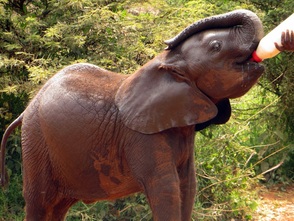
After the events of yesterday, Megan and I felt it would be beneficial to take a day off to go and visit an elephant orphanage. Located about an hour away, we took three matatus and, after being misguided to the wrong destination, a taxi just to get to the right place. The hassle was worth it.
Seeing baby versions of our favorite animal, bounding down towards us in a line - each one a pint-sized version of an adult - was one of the most endearing sights I've been witness to in a long time. The elephants ranged from a couple months to a couple years old, most of them made orphans by the actions of poachers killing their parents for ivory. Once they're able, the workers at the orphanage re-integrate them into the wild, but the process takes about 5 years for a new heard of elephants to accept them. It's true what they say about elephant memories, too: years can pass, but if one of the workers goes into the wild to check on the progress of the elephants, they will still remember each and every one of the people. Awesome.
While we weren't going to go into Faraja today, I got a call that Omare, Martha's oldest son - the one who had his face split open while trying to protect the children of Faraja from armed bandits who attacked and wielded machetes - was coming in today. I needed to jump at the opportunity to interview him about that night.
Filming him as he walked me through how that night went down was a powerful experience, and it took a tremendous amount of courage for him to defend the kids. It was really good to see him again, alive and well.
Seeing baby versions of our favorite animal, bounding down towards us in a line - each one a pint-sized version of an adult - was one of the most endearing sights I've been witness to in a long time. The elephants ranged from a couple months to a couple years old, most of them made orphans by the actions of poachers killing their parents for ivory. Once they're able, the workers at the orphanage re-integrate them into the wild, but the process takes about 5 years for a new heard of elephants to accept them. It's true what they say about elephant memories, too: years can pass, but if one of the workers goes into the wild to check on the progress of the elephants, they will still remember each and every one of the people. Awesome.
While we weren't going to go into Faraja today, I got a call that Omare, Martha's oldest son - the one who had his face split open while trying to protect the children of Faraja from armed bandits who attacked and wielded machetes - was coming in today. I needed to jump at the opportunity to interview him about that night.
Filming him as he walked me through how that night went down was a powerful experience, and it took a tremendous amount of courage for him to defend the kids. It was really good to see him again, alive and well.
7.20 - 7.21.13
I know I've written of lazy weekends before, but this weekend was a real, real lazy one. Megan was very under the weather with food poisoning, so we stayed in and caught up on sleep, journaling, and Boardwalk Empire.
7.22.13
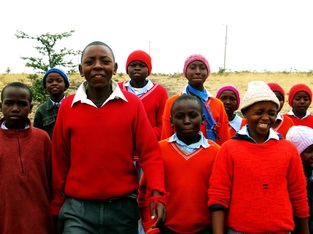
Today was special. It was the first day we were able to get out to Ebenezer, the original orphanage that inspired the adventure. To be honest, as excited as I was to see the kids, I was equally nervous. I didn't expect any of them to remember me - it'd been three years. But I was hoping they would, just a little, because I've had each and every one of their faces etched indelibly in my mind.
We were picked up by Martin, the founder and director of Ebenezer. He's an outspoken, opinionated, charismatic guy with a good heart. When he picked us up, I noticed bullet holes in his car. A month ago, he was sitting in his car on the side of the road when 5 guys pulled up with guns and held him up. He was able to get away, but not without damage to his vehicle and a few injuries (though, thankfully, no gunshot wounds). Wow.
On the drive out to Ebenezer, which is a little over an hour, Martin told me every kid would remember me. Last time I was there I helped to build a library, which they still use, and I guess sometimes when they do it reminds them of me, which is humbling. There are also six kids at Ebenezer who are mentally handicapped, and Martin said that they, too, remember me, but refer to me as "Axe" because Alex is tough for them to pronounce, since there aren't really any words like it in Swahili.
We were picked up by Martin, the founder and director of Ebenezer. He's an outspoken, opinionated, charismatic guy with a good heart. When he picked us up, I noticed bullet holes in his car. A month ago, he was sitting in his car on the side of the road when 5 guys pulled up with guns and held him up. He was able to get away, but not without damage to his vehicle and a few injuries (though, thankfully, no gunshot wounds). Wow.
On the drive out to Ebenezer, which is a little over an hour, Martin told me every kid would remember me. Last time I was there I helped to build a library, which they still use, and I guess sometimes when they do it reminds them of me, which is humbling. There are also six kids at Ebenezer who are mentally handicapped, and Martin said that they, too, remember me, but refer to me as "Axe" because Alex is tough for them to pronounce, since there aren't really any words like it in Swahili.
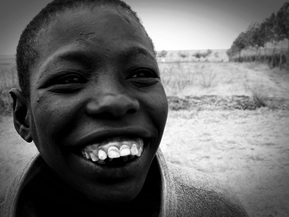
The drive went by fast, and before I knew it we were at the gates of Ebenezer. I was greeted by a boy named Destiny, the newest and youngest member of Ebenezer. He refers to himself as mzee, which means old man in Swahili. He's 3 and 1/2. We shared tea and cookies with Destiny in Martin's office until the kids returned home from school for lunch. I was still nervous.
As soon as the first kid I saw smiled in my direction, my nerves subsided. Most of the kids were shy at first, but when I made it clear that I remembered their names, they started to open up. Seeing them interact with Megan with such inquisitive awe and compassion was a sight to cherish.
There's a game the kids taught me the last time I was here, which is basically chasing one another around with a long piece of savannah grass, trying to stick it in one another's ear. Simple, but seeing and hearing how much it makes the kids smile and laugh? Well...it'd be impossible to not feel like a billion bucks after that. Perfect way to end the day.
As soon as the first kid I saw smiled in my direction, my nerves subsided. Most of the kids were shy at first, but when I made it clear that I remembered their names, they started to open up. Seeing them interact with Megan with such inquisitive awe and compassion was a sight to cherish.
There's a game the kids taught me the last time I was here, which is basically chasing one another around with a long piece of savannah grass, trying to stick it in one another's ear. Simple, but seeing and hearing how much it makes the kids smile and laugh? Well...it'd be impossible to not feel like a billion bucks after that. Perfect way to end the day.
7.23.13
Today I had an interview with Paul who, for the last couple days, has been living at the training facility where he plays soccer. Paul is 25. He's also been a complete orphan since he was 12. At Faraja, he was not getting paid, but the roof over his head and food was justified for him to do the work he was assigned. He was also told that he would be helped, in exchange for his work, in his pursuit of higher education and ensuing school fees. That never came.
The most disturbing thing I learned from the interview with Paul is this: at Faraja, the children are caned - beaten with a thick stick on the butt or back as a means of discipline, which often results in deep contusions. I asked Paul which children had been caned, and he said most.
It's never OK to hit a child. It's also illegal in Kenya to cane children, as of three months ago.
On top of that, the more accurate reason why the kids were lethargic and morose last week is because, according to Paul, all of the older kids were denied lunch and dinner as a means of punishment for the dairy cow not having been fed that morning.
So, caning and denying the children food goes on at Faraja. Neither is OK. Neither is justified. Right now, I don't know how to go about approaching this. I don't want this to happen to the kids, but if I speak up and Faraja is closed, what will happen to the kids? Will they be put in an even worse, more abusive situation? How much bad can be justified for some good to be done? And is it worth it to stay silent about this because the children there are, ultimately, at the end of the day, cared for with food, clothing, and shelter?
One thing I do know is I haven't felt this sick about a situation on the trip as I did when experiencing the child being sex trafficked in Cambodia with nothing I could do about it.
The most disturbing thing I learned from the interview with Paul is this: at Faraja, the children are caned - beaten with a thick stick on the butt or back as a means of discipline, which often results in deep contusions. I asked Paul which children had been caned, and he said most.
It's never OK to hit a child. It's also illegal in Kenya to cane children, as of three months ago.
On top of that, the more accurate reason why the kids were lethargic and morose last week is because, according to Paul, all of the older kids were denied lunch and dinner as a means of punishment for the dairy cow not having been fed that morning.
So, caning and denying the children food goes on at Faraja. Neither is OK. Neither is justified. Right now, I don't know how to go about approaching this. I don't want this to happen to the kids, but if I speak up and Faraja is closed, what will happen to the kids? Will they be put in an even worse, more abusive situation? How much bad can be justified for some good to be done? And is it worth it to stay silent about this because the children there are, ultimately, at the end of the day, cared for with food, clothing, and shelter?
One thing I do know is I haven't felt this sick about a situation on the trip as I did when experiencing the child being sex trafficked in Cambodia with nothing I could do about it.
7.24.13
As depressed as I feel about the situation at Faraja, I feel even more hopeful about life at Ebenezer. Today was a long day at the orphanage, about a 12 hour one, but it absolutely flew by. At the risk of sounding like a broken record, I had another beyond heartwarming experience that I'll remember until my hair's all gone and I can't remember how to remember.
We were all standing outside as the sun was going down, the kids and Martin showing Megan and me the greenhouses they've built and the plans about them. Everyone was quiet, and out of the blue I asked if they remembered the chorus that I taught them three years ago. They did. Not only did they remember it, they sang it in almost perfect unison without me prompting any of the lyrics. And the thing of it is, they never had a copy of the lyrics written down, or a copy of the song that the chorus appeared on. They sang it all, including the melody, from memory. If I weren't a programmed automaton, I would've cried.
We were all standing outside as the sun was going down, the kids and Martin showing Megan and me the greenhouses they've built and the plans about them. Everyone was quiet, and out of the blue I asked if they remembered the chorus that I taught them three years ago. They did. Not only did they remember it, they sang it in almost perfect unison without me prompting any of the lyrics. And the thing of it is, they never had a copy of the lyrics written down, or a copy of the song that the chorus appeared on. They sang it all, including the melody, from memory. If I weren't a programmed automaton, I would've cried.
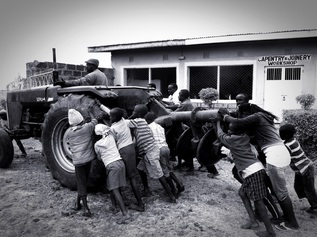
I asked them if they wanted to hear the song that featured the chorus they sang, and in the dark we were all huddled around the tiny speaker of my phone listening to them sing beautifully. I was worried maybe they wouldn't like my addition to the track, my voice or rapping, but they did, and that made me happy. They're also excited to learn a new chorus, which I have in my head and want them on for the next album. I can't wait!
During the day today, I also paid to have about an acre of property they own plowed. They're going to use it to plant a bunch of crops and, as soon as they get irrigation fully installed (it's almost there) they'll be able to be almost fully self-sufficient food-wise. That's one of my ultimate dreams for Ebenezer, and I hope this goes some small way to helping them achieve economic independence soon.
During the day today, I also paid to have about an acre of property they own plowed. They're going to use it to plant a bunch of crops and, as soon as they get irrigation fully installed (it's almost there) they'll be able to be almost fully self-sufficient food-wise. That's one of my ultimate dreams for Ebenezer, and I hope this goes some small way to helping them achieve economic independence soon.
7.25.13
After unsuccessfully attempting to book my flight from Kenya to South Africa on four separate occasions, one of which being where I hit submit payment and the internet stopped working for three minutes and when it came back on the fare increased by $50, and many, many phonecalls and emails with Rwandair, I had reserved a ticket but could not pay for it online due to an error on their end. So I had to go into downtown Nairobi to get the ticket in person at their office before the end of the day, or else the reservation would be invalid. Silly.
Megan and I made the most of it, and went to the Masai market after getting the ticket. I wouldn't say this should be at the top of your "must see" list, but it's certainly something to experience. There are about 100 small shops in a small area, with many of the exact same things sold at every one. Even though there are carbon copies of everything from fake Masai spears to drums to chessboards to jewelry, every shop owner will try to convince you his or hers are carved /weaved/whittled by hand in their house.
They'll also start you out at a price that's about 10 times what you'll end up paying if you're a skillful haggler, which is an art I love to hate to love. Anyway, I got some bookends and Megan got some souvenirs for her folks.
We also met with Hezekiel, the cousin of Shadrack who you may remember from my experience at the airport in Mumbai. Hezekiel works for Citizen News, which is one of the largest news outlets in the continent, if not the largest. He's a journalist and a super nice guy, and wanted to know more about the trip. We chatted over pizza, and he wants Megan and I to stop by the Citizen News tour and see the whole operation - TV, radio, newspaper - when we get a chance. Awesome!
Megan and I made the most of it, and went to the Masai market after getting the ticket. I wouldn't say this should be at the top of your "must see" list, but it's certainly something to experience. There are about 100 small shops in a small area, with many of the exact same things sold at every one. Even though there are carbon copies of everything from fake Masai spears to drums to chessboards to jewelry, every shop owner will try to convince you his or hers are carved /weaved/whittled by hand in their house.
They'll also start you out at a price that's about 10 times what you'll end up paying if you're a skillful haggler, which is an art I love to hate to love. Anyway, I got some bookends and Megan got some souvenirs for her folks.
We also met with Hezekiel, the cousin of Shadrack who you may remember from my experience at the airport in Mumbai. Hezekiel works for Citizen News, which is one of the largest news outlets in the continent, if not the largest. He's a journalist and a super nice guy, and wanted to know more about the trip. We chatted over pizza, and he wants Megan and I to stop by the Citizen News tour and see the whole operation - TV, radio, newspaper - when we get a chance. Awesome!
7.26.13
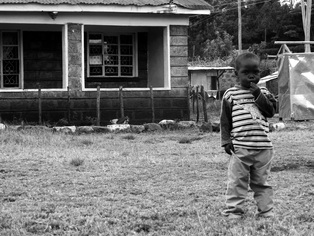
Any doubts I had about Paul's revelations that the children of Faraja are caned and denied food dissolved today. I had some quiet time with one of the kids and asked them, "if you do something bad at Faraja, what happens to you?" At first they said, "we just get talked to and told not to do that again", but when I asked if there was anything more that gets done, they told me quietly, "if we talk badly about Faraja around anyone else, especially volunteers or visitors, we will get the choice of either being caned with the ugali stick in the kitchen, or kicked out of Faraja. If Martha knows I told you this, I would be kicked out. If the cow isn't fed in the morning, me and the other older kids don't get any lunch or dinner that day. If someone is seen watching TV during the afternoon, they will be denied food."
I also confirmed with them that Becky and Lydia each have several kids at Faraja, which is something about which I'm still lied to.
Aside from the fact that caning children is, in my opinion, morally wrong, it's also illegal (as of 3 months ago) in Kenya.
I'm not naive. I know, first hand, how poorly kids around the world often get treated. Having worked as a guard in a maximum security juvenile jail for three years, I've seen its effects. Some people might say that it's cultural, and that it's wrong to impose an individual set of ethics on another culture. Largely, I'd agree with that. But in the case of children being beaten, ethical relativism is something that just doesn't hold weight. Not in the slightest.
Upon returning home today, I noticed that I was missing money out of my luggage, and Megan was, too. I did my finances for the last month and a half, totaling every last schilling I spent, and realized I was missing well over $150. Megan, about $75. My gut tells me it's probably one of the other "volunteers" that rarely leaves the house, but there's no way to be sure. Starting tomorrow, though, we'll be able to lock our door.
I also confirmed with them that Becky and Lydia each have several kids at Faraja, which is something about which I'm still lied to.
Aside from the fact that caning children is, in my opinion, morally wrong, it's also illegal (as of 3 months ago) in Kenya.
I'm not naive. I know, first hand, how poorly kids around the world often get treated. Having worked as a guard in a maximum security juvenile jail for three years, I've seen its effects. Some people might say that it's cultural, and that it's wrong to impose an individual set of ethics on another culture. Largely, I'd agree with that. But in the case of children being beaten, ethical relativism is something that just doesn't hold weight. Not in the slightest.
Upon returning home today, I noticed that I was missing money out of my luggage, and Megan was, too. I did my finances for the last month and a half, totaling every last schilling I spent, and realized I was missing well over $150. Megan, about $75. My gut tells me it's probably one of the other "volunteers" that rarely leaves the house, but there's no way to be sure. Starting tomorrow, though, we'll be able to lock our door.
7.27.13
After another emotionally draining week, we thought it prudent to go to the theater and watch giant robots beat up giant aliens. Pacific Rim was actually a really fun movie.
Afterwards, we went and had some of the most delicious Indian food either one of us had experienced and got caught in a downpour with no coat or umbrella. In over a month, this is one of the first times it's rained, and I'm sure the farmers sorely needed it. Here's to hoping it'll help with the newly plowed field at Ebenezer!
Afterwards, we went and had some of the most delicious Indian food either one of us had experienced and got caught in a downpour with no coat or umbrella. In over a month, this is one of the first times it's rained, and I'm sure the farmers sorely needed it. Here's to hoping it'll help with the newly plowed field at Ebenezer!
7.28.13
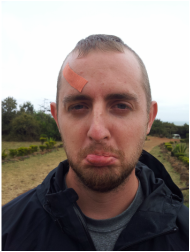
So there I was, finishing hanging the last pieces of laundry on the line outside when I noticed a clothes pin on the ground that someone left behind. I figured I'd be polite and pick it up. I didn't figure the window, complete with cast iron window frame, would be open. I turned into it at full speed, ramming my head into the corner of it. I immediately covered my head, and it felt wet. I had no idea why, since I wasn't crying because I'm basically a robot. After pulling my hand back, and seeing it covered in blood it allllll made sense.
Nothing like a head split open and getting stitched up to put a little kink in your plans for the day!
Boo.
Hoo.
Nothing like a head split open and getting stitched up to put a little kink in your plans for the day!
Boo.
Hoo.

But after making our third trip to the nearby clinic, Zam Zam, we were off (a couple hours later) to do what we had been looking forward to for several weeks: staying overnight at Sunset Savannah resort, the same place where we watched the sunset with the baboon a little while back.
If and when you go to Kenya, you need to make a trip here. It's worth it. The staff is without question the most hospitable and polite of any place I've ever stayed, and after sleeping on a single bed where the metal frame of the bunk bed has been poking my ribs for the last 6 weeks, this felt like sleeping on a big puffy, pillowy cloud of buttery mashed potatoes (which I imagine must be comfortable).
If and when you go to Kenya, you need to make a trip here. It's worth it. The staff is without question the most hospitable and polite of any place I've ever stayed, and after sleeping on a single bed where the metal frame of the bunk bed has been poking my ribs for the last 6 weeks, this felt like sleeping on a big puffy, pillowy cloud of buttery mashed potatoes (which I imagine must be comfortable).
7.29.13
After waking up with the sun and having a delicious breakfast, we bid adieu to or gorgeous campsite and went to Faraja for a few hours.
It's tough for me to write about Faraja right now. As much as I love the kids, it's tough to be here and not confront Martha and the other workers about everything I've learned over the last couple days. It's tough to keep a poker face.
In the afternoon, Megan and I went into town to the headquarters for Citizen and Nation Media with our new friend Hezekiel. We were shown the TV studio (home to KTV and Citizen television, broadcasters of the Spanish soap operas I've grown to love while staying at Naomi's), radio stations, and all the different newspaper rooms. In the span of about 10 floors of workers, we saw one white guy. He looked just as shocked and confused to see us as we were to see him.
It's tough for me to write about Faraja right now. As much as I love the kids, it's tough to be here and not confront Martha and the other workers about everything I've learned over the last couple days. It's tough to keep a poker face.
In the afternoon, Megan and I went into town to the headquarters for Citizen and Nation Media with our new friend Hezekiel. We were shown the TV studio (home to KTV and Citizen television, broadcasters of the Spanish soap operas I've grown to love while staying at Naomi's), radio stations, and all the different newspaper rooms. In the span of about 10 floors of workers, we saw one white guy. He looked just as shocked and confused to see us as we were to see him.
7.30.13
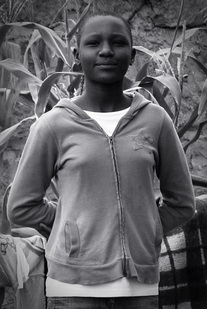
A new girl came to Faraja today. Her name is Mary. She's 13 and ran away from home. The reason she ran away is because she was forced into marriage by her father to a man in his 40's. Her dad married her off because, in the Masai tradition, he gets several dozen cows and money in exchange for her.
Mary didn't want to be married off, and her mom didn't want her to be either. Her mom stood up to her dad, who subsequently beat her. Mary's mom is now in the hospital in serious condition, and Mary is staying at Faraja until everything gets sorted out.
Mary didn't want to be married off, and her mom didn't want her to be either. Her mom stood up to her dad, who subsequently beat her. Mary's mom is now in the hospital in serious condition, and Mary is staying at Faraja until everything gets sorted out.
7.31.13
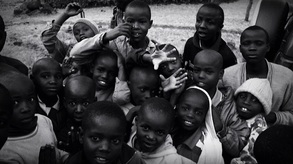
As seems to be the theme every day at Ebenezer, today was magic. In the morning, we spent time with Destiny, KunuKunu and his brothers, Mawa, and the younger kids. In the evening, I asked some of the kids if they wanted to learn and sing the new chorus. They excitedly said yes and, five minutes later, they gathered everyone together in the dining room where we sang take after take of the new chorus, their voices innately coming together to form a beautiful melody that'd take months to teach to untrained kids back home. Here's the chorus they sang:
I'm gonna fly high
And I won't back down
I won't touch the ground
On the wings of sound
I'll soar
And you won't see me anymore
Until we stand together in the sun
Run, run, run
After singing the new chorus, they shared some gorgeous hymns with us, had me rap for them, and we shared stories, smiles, and laughter until well after the sun went down.
I love it here.
I love it here.
8.1.13
Impromptu day off today, as both Megan and I weren't feeling too well physically. Recharge the batteries and up and at em tomorrow.
8.2.13
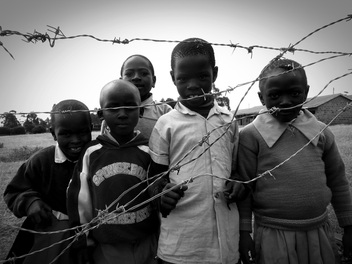
This was the first time in our entire stay at Faraja that we were alone with Martha, the house mother. I knew I wouldn't get this opportunity again, and I wanted to get the truth out of her without tipping my hand too much. I shared with her the kinds of discipline I experienced in orphanages in other countries, and told her that some people still cane the kids and deny them food.
At first she was defensive, and asked if I wanted to leave Faraja. I said, "no, I'm just talking about things I've experienced and heard about. What kind of discipline goes on here?" To my surprise, she admitted to caning, and even to doing it herself. She denied not giving the children food, though. She said she canes the kids because they all agreed that that would be their punishment for bad behavior. I asked her if she knew caning was illegal, but she told me that even though she knew it was, a lot of people still do it. When I told her that, in my opinion, caning a child was never OK, she told me she was just doing what she knew, what she was given growing up. I told her it didn't have to be that way.
We talked about positive reinforcement as a means of discipline. Giving gold stars to kids for good deeds and acts and grades, and rewarding positive behavior with something small like a movie night or a pizza or ice cream. She took notes on the ideas Megan and I brought up, and seemed excited and interested to instill them in lieu of caning. I hope she means it, because positive reinforcement is proven to be more effective than corporal punishment.
I understand that she's a product of her generation, or her childhood, and doing what she knows how to do, and what she was taught. It's hard to fault her 100% for everything if she really didn't fully know any other way of disciplining the kids. The true test will come moving forward, now that she does know an alternate way. If she makes a change, she truly wants to do better and cares for the kid. But if she doesn't, it'd be nearly impossible to say that she has the best interests of the children at heart. I'm hoping for the former, but fearful it'll be the latter.
At first she was defensive, and asked if I wanted to leave Faraja. I said, "no, I'm just talking about things I've experienced and heard about. What kind of discipline goes on here?" To my surprise, she admitted to caning, and even to doing it herself. She denied not giving the children food, though. She said she canes the kids because they all agreed that that would be their punishment for bad behavior. I asked her if she knew caning was illegal, but she told me that even though she knew it was, a lot of people still do it. When I told her that, in my opinion, caning a child was never OK, she told me she was just doing what she knew, what she was given growing up. I told her it didn't have to be that way.
We talked about positive reinforcement as a means of discipline. Giving gold stars to kids for good deeds and acts and grades, and rewarding positive behavior with something small like a movie night or a pizza or ice cream. She took notes on the ideas Megan and I brought up, and seemed excited and interested to instill them in lieu of caning. I hope she means it, because positive reinforcement is proven to be more effective than corporal punishment.
I understand that she's a product of her generation, or her childhood, and doing what she knows how to do, and what she was taught. It's hard to fault her 100% for everything if she really didn't fully know any other way of disciplining the kids. The true test will come moving forward, now that she does know an alternate way. If she makes a change, she truly wants to do better and cares for the kid. But if she doesn't, it'd be nearly impossible to say that she has the best interests of the children at heart. I'm hoping for the former, but fearful it'll be the latter.
8.3.13
Nothing new to report today, just another standard day at Faraja, trying to figure out how best to reconcile the want to help the kids with the disappointment in the treatment of the kids and the lies.
8.4.13
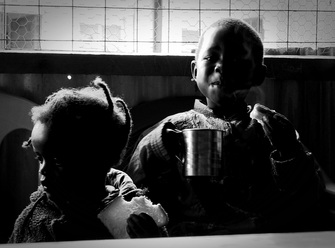
Faraja has been planning a fundraiser for the last couple months, to be held in downtown Nairobi with, apparently, some powerful political figures planning to be in attendance. On the invitation to the fundraiser, Megan and I are listed as guests of honor along with a governor, congressman, and the like (they wrote our name as "Mr. and Mrs. Alexander Halleff"). Given that we were listed as guests of honor, and have donated several hundred dollars and hours of manual labor, it came as a bit of a surprise when we were given the most expensive tickets to the fundraising event and expected to pay for them - $50/each.
So it also came as a bit of a surprise that they were holding a rather spontaneous fundraiser on the grounds of Faraja today, for one, and for two that we were each asked to make a donation just to walk through the gate to volunteer today. Not a fan.
After a couple minutes, Edgar - the social worker at Faraja - arrived and asked me about the conversation I had with Martha regarding the caning and discipline. I told him that Martha, bluntly, said that she does it. He said that was news to him and that I must have misunderstood her. He looked shocked and taken aback, and told me that she was quite upset after our conversation which, in and of itself, was news to me, largely because she didn't seem upset in the slightest when we spoke about it.
It's incredible how careful they must be about when, where, and in front of who they cane the kids. The fact that Martha apparently shields this practice from volunteers and Edgar says to me that she knows it's wrong and illegal. I wonder if she confessed to Edgar that she does in fact cane the kids, but it doesn't sound like it.
So it also came as a bit of a surprise that they were holding a rather spontaneous fundraiser on the grounds of Faraja today, for one, and for two that we were each asked to make a donation just to walk through the gate to volunteer today. Not a fan.
After a couple minutes, Edgar - the social worker at Faraja - arrived and asked me about the conversation I had with Martha regarding the caning and discipline. I told him that Martha, bluntly, said that she does it. He said that was news to him and that I must have misunderstood her. He looked shocked and taken aback, and told me that she was quite upset after our conversation which, in and of itself, was news to me, largely because she didn't seem upset in the slightest when we spoke about it.
It's incredible how careful they must be about when, where, and in front of who they cane the kids. The fact that Martha apparently shields this practice from volunteers and Edgar says to me that she knows it's wrong and illegal. I wonder if she confessed to Edgar that she does in fact cane the kids, but it doesn't sound like it.
8.5.13
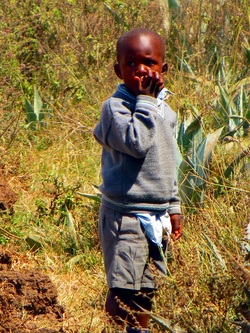
Today was our last day volunteering at both Faraja and Ebenezer. The two places that inspired this journey to begin, and the time has come to say goodbye to the kids again. I'd be lying if I said this time around was as inspiring as the last at Faraja. The rose colored glasses with which I used to view Martha and everything that went on there have lost much of their luster, and are now just clear, plain and simple. I guess that's what happens when unknown truths start to be uncovered, the band-aid taken off the wound. When everything is seen for what it really is, instead of what one believes or tries to make it to be, the remains of hope and reality colliding can be messy to sift through. I've been finding myself trying to find meaning but, at the risk of sounding a bit too much like Camus, sometimes things just are. Sometimes things just happen. That's a bitter pill to swallow.
As much as I love the kids here, and hope that Martha and the rest of the caregivers begin to be truthful with future volunteers, from Kenya and abroad, with people in the community, and, most of all, to themselves, it's time to move on. I realized today that even though I've learned goodbyes are never easy, I still hold a wish for how they would hopefully go. I wish for true heart-to-hearts, hugs, smiles...authentic human interaction. When that doesn't end up being the case, it's a little bittersweet. Almost two months here, but the goodbye was about as brief as they come.
As much as I love the kids here, and hope that Martha and the rest of the caregivers begin to be truthful with future volunteers, from Kenya and abroad, with people in the community, and, most of all, to themselves, it's time to move on. I realized today that even though I've learned goodbyes are never easy, I still hold a wish for how they would hopefully go. I wish for true heart-to-hearts, hugs, smiles...authentic human interaction. When that doesn't end up being the case, it's a little bittersweet. Almost two months here, but the goodbye was about as brief as they come.
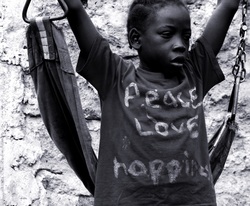
I remember holding Kepha in my arms three years ago, as he would drift off the sleep with a fever from the HIV, but smiling in the little piece of comfort and solace we shared. Now he's a full-grown five year-old who'll have to navigate through the world with some of the worst cards anyone can be dealt and learn to make sense of them. I don't know what the world has in store for him, but I hope it treats him better than it did from the get-go.
I'll never be able to communicate to him how much he changed my life by simply being. He's said goodbye to dozens of volunteers before and after me, and many more will come and go. Truth be told, his goodbye to me may just have been the same as it is to everyone else. The brevity of our goodbye may be for the best. I just hope I've repaid a fraction of the impact he made on my life.
I'll never be able to communicate to him how much he changed my life by simply being. He's said goodbye to dozens of volunteers before and after me, and many more will come and go. Truth be told, his goodbye to me may just have been the same as it is to everyone else. The brevity of our goodbye may be for the best. I just hope I've repaid a fraction of the impact he made on my life.
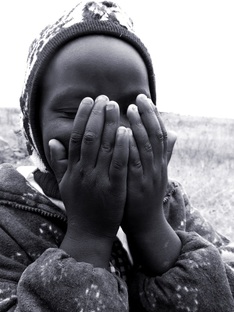
At Ebenezer, the goodbye that I secretly hope for happened last time I was here, and it happened again tonight. Being able to connect, I mean truly connect, as one soul to another, is one of the greatest gifts we're given.
I interviewed as many of the kids as I could, asked them about their favorite things, what they want to do with their lives, and what makes them the most happy. They sang songs for us. They danced for us.
One of the youngest and sassiest girls, Catherine, asked if she could sing me a song. I said of course she could. She shyly sang me the chorus for the song I taught them three years ago (when she was only 6), and the chorus I taught them the other day. That will definitely be one of my favorite memories from the whole trip.
When the kids were eating dinner, Megan and I walked into the dining hall to say goodbye. When we entered, all of the kids stood up, and you could've heard a piece of hay hit the floor. It was time to say goodbye. The fact that it was the kind I always hope for? I realized that makes it even more difficult.
I interviewed as many of the kids as I could, asked them about their favorite things, what they want to do with their lives, and what makes them the most happy. They sang songs for us. They danced for us.
One of the youngest and sassiest girls, Catherine, asked if she could sing me a song. I said of course she could. She shyly sang me the chorus for the song I taught them three years ago (when she was only 6), and the chorus I taught them the other day. That will definitely be one of my favorite memories from the whole trip.
When the kids were eating dinner, Megan and I walked into the dining hall to say goodbye. When we entered, all of the kids stood up, and you could've heard a piece of hay hit the floor. It was time to say goodbye. The fact that it was the kind I always hope for? I realized that makes it even more difficult.
8.6.13
Last night when I went to bed I had the chills. Then I had the sweats. Then I couldn't breathe. I had fever dreams all night and awoke to a nice potpourri of nausea, dizziness, and feverness. Not the most ideal way to say goodbye to my house mom, but it had to do. Thank you to Naomi for welcoming us into your home for the last two months.
With Megan set to fly out the 8th, we wanted to spend our last days together on a bed bigger than a shoebox, and maybe with the luxury of a hot shower. We went into downtown Nairobi, back to the awesome hotel with the really unfortunate location from last month. A good place to try to sweat the fever out. And less than $60 for a penthouse suite? That's a no-brainer.
With Megan set to fly out the 8th, we wanted to spend our last days together on a bed bigger than a shoebox, and maybe with the luxury of a hot shower. We went into downtown Nairobi, back to the awesome hotel with the really unfortunate location from last month. A good place to try to sweat the fever out. And less than $60 for a penthouse suite? That's a no-brainer.
8.7.13

Nothing puts hair on your chest like waking up to the news that a third of the airport you are due to fly out of in two days burned to the ground. Apparently a fire started in the customs area of the Jomo-Kenyatta Airport in Nairobi, and all flights out and in for today, and the undetermined future, are canceled. The bad news is this will cause a large change in travel plans, most likely. The good news is I most likely get to spend more time together with Megan. I can't imagine the headaches this will cause for thousands of travelers.
Also, I woke up feeling worse than the day before. It probably didn't help that the hotel was right next to a mosque broadcasting prayer at intermittent intervals from 2am until 8am, due to Ramadhan coming to an end.
Also, I woke up feeling worse than the day before. It probably didn't help that the hotel was right next to a mosque broadcasting prayer at intermittent intervals from 2am until 8am, due to Ramadhan coming to an end.
8.8.13
Megan's flight was canceled and rebooked to Tuesday, after she spent nearly two hours on the phone with Delta (who had no idea what to do). My flight was fine, but I rebooked it to Tuesday to spend more time together, and because I didn't want her to have to navigate through Nairobi alone.
We changed venues from our little island oasis in a sea of a whole lot of danger to the hotel embassy, which is about 10% as nice, but safely in the heart of downtown. Even though we went from a really comfortable king size to sharing a double, and our view went from sunrise to paint peeling off a pipe that runs up the side of the building, it was a good move.
At night, we went to the Faraja fundraiser. In my head, I envisioned it being held in a moderately large venue, with a program and a couple hundred people, based largely off of the impression that I got from Martha telling me about it. But when we arrived to the spot, it was the opposite. About 50 people sitting quietly in a small room, few people even talking to one another. (Side note: it's amazing how much technology inhibits human interaction, even in a place in which it's introduction is relatively recent).
We changed venues from our little island oasis in a sea of a whole lot of danger to the hotel embassy, which is about 10% as nice, but safely in the heart of downtown. Even though we went from a really comfortable king size to sharing a double, and our view went from sunrise to paint peeling off a pipe that runs up the side of the building, it was a good move.
At night, we went to the Faraja fundraiser. In my head, I envisioned it being held in a moderately large venue, with a program and a couple hundred people, based largely off of the impression that I got from Martha telling me about it. But when we arrived to the spot, it was the opposite. About 50 people sitting quietly in a small room, few people even talking to one another. (Side note: it's amazing how much technology inhibits human interaction, even in a place in which it's introduction is relatively recent).
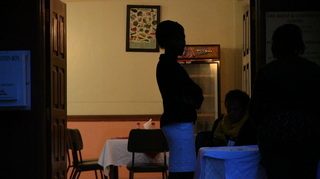
As the night progressed, the atmosphere remained the same and the attendance didn't really grow. As people made speeches about Faraja - from Martha to some of the caregivers - folks would get up and leave. By the end, it was only the volunteers left in attendance. The goal of the event was to raise a couple million schillings to buy the property upon which Faraja sits. They ended up raising about 20,000 schillings. Much of the Faraja board wasn't even in attendance.
Regardless of how differently I feel about Faraja now, I hoped for their fundraiser to be a success. It was painful to watch Martha and the other workers force smiles as they thanked us for coming. It was also tough to get the impression from the way we were nonchalantly said bye to that the work we poured ourselves into for two months didn't seem to be appreciated. While recognition never was, isn't, nor will ever be the aim for any part of volunteering on this journey, everyone appreciates feeling appreciated.
Regardless of how differently I feel about Faraja now, I hoped for their fundraiser to be a success. It was painful to watch Martha and the other workers force smiles as they thanked us for coming. It was also tough to get the impression from the way we were nonchalantly said bye to that the work we poured ourselves into for two months didn't seem to be appreciated. While recognition never was, isn't, nor will ever be the aim for any part of volunteering on this journey, everyone appreciates feeling appreciated.
8.9 - 8.10.13
One of my goals before we were due to leave was to get an interview with Martin, the director and founder of Ebenezer. Each day we made our plans around his schedule, and each day ended up not yielding an interview. For the most part we wandered around and got some food and spent time in the hotel room reveling in hot showers.
8.11.13

We wandered around town a bit more today and ended up at one of the city parks in the afternoon. Our goal was to lie in the sun and relax, but that was derailed by a group of street kids who, one after another, asked for money from us. Ah well.
We did go to a delicious Chinese restaurant, and selected it almost solely due to the fact that every single person eating there was Chinese. I've found it's always a good rule of thumb to eat at restaurants where people of that ethnicity seem to be piled in by the clown car. Such was the case here.
Three massive groups of Chinese folks came into the restaurant, one after another, which is vexing because neither one of us ever saw a Chinese person on the streets of Nairobi. We also sat next to a man whose face looked EXACTLY like the laughing Buddha. It was uncanny. And awesome.
We did go to a delicious Chinese restaurant, and selected it almost solely due to the fact that every single person eating there was Chinese. I've found it's always a good rule of thumb to eat at restaurants where people of that ethnicity seem to be piled in by the clown car. Such was the case here.
Three massive groups of Chinese folks came into the restaurant, one after another, which is vexing because neither one of us ever saw a Chinese person on the streets of Nairobi. We also sat next to a man whose face looked EXACTLY like the laughing Buddha. It was uncanny. And awesome.
8.12.13
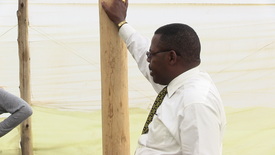
For the first time in my life, I sat in a completely empty movie theater. It's kind of creepy, simultaneously awesome, and I couldn't help but think about how there was no way they turned a profit by showing it to us, because the cost of the electricity to run the projector alone must've been more than our combined $8 ticket.
Finally got the chance today to interview Martin, and I'm glad I did. He's a well-spoken, charismatic, and knowledgeable guy who really cares for the kids at Ebenezer. Though we had to shoot it in our tiny hotel room, it was better than nothing, and a really great interview.
Finally got the chance today to interview Martin, and I'm glad I did. He's a well-spoken, charismatic, and knowledgeable guy who really cares for the kids at Ebenezer. Though we had to shoot it in our tiny hotel room, it was better than nothing, and a really great interview.
8.13.13
Of all the "see you soons" I've had to say, today was one of the most difficult. Megan and I got a ride to the airport from some of the friends we made at Savannah resort, and when we arrived, we did our best to navigate through the makeshift airport set up in the wake of the massive fire. With my flight at 5 pm and hers at 10, the time came to say goodbye.
Of all things I'm not a fan of in life, being the cause of someone I love to cry is at the top of the list. I suppose it's unavoidable in the work I've chosen, but the knowledge of that doesn't make it any easier. Thank you, Megan, for the smiles and sharing the adventure with me.
Next stop, South Africa.
Of all things I'm not a fan of in life, being the cause of someone I love to cry is at the top of the list. I suppose it's unavoidable in the work I've chosen, but the knowledge of that doesn't make it any easier. Thank you, Megan, for the smiles and sharing the adventure with me.
Next stop, South Africa.
 RSS Feed
RSS Feed